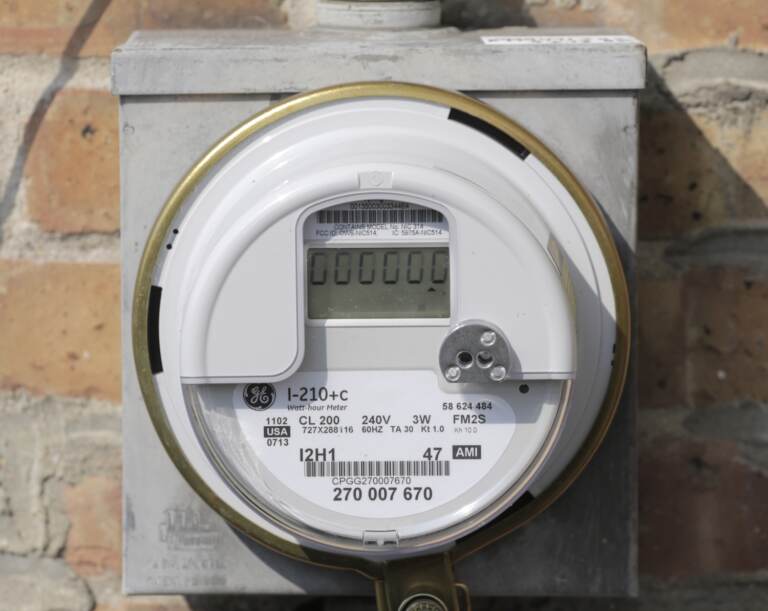Electric bills in N.J. are about to shoot higher. Lawmakers are scrambling to hold the line on costs
An Assembly committee has approved an eight-bill package focused on energy affordability. The problem is the PJM grid is not keeping pace with demand.
Listen 1:01
A utility meter is seen in a file photo. (AP Photo/M. Spencer Green)
From Camden and Cherry Hill to Trenton and the Jersey Shore, what about life in New Jersey do you want WHYY News to cover? Let us know.
With electricity prices poised to surge across New Jersey, state lawmakers have been looking for ways to try and control energy costs.
In February, after the state’s annual electricity auction, the Board of Public Utilities, or BPU, announced that Garden State residents would pay 17% to 20% more for electricity, depending on where they live, starting June 1.
On Monday, the Assembly Telecommunications and Utilities Committee approved an eight-bill package focused on energy affordability.
“What we are hearing loud and clear from our constituents is that they can’t afford to pay more for electricity. We are working to lower costs now and to ensure that in the years ahead, residents can count on a fair deal,” Committee Chairman Wayne DeAngelo, D-Mercer, said. “We’re trying to put together what actions we can do, and get our federal representatives engaged, because this isn’t positive, we’ve got another auction coming up in July.”
What do the measures call for?
One bill calls for the BPU to establish a beneficial building electrification program and requires electric public utilities to prepare and implement beneficial building electrification plans, such as changing from nonelectric to electric water heaters and space heaters.
Another measure would require the BPU to determine and consider the lowest reasonable return on equity before approving electric, gas and water public utility base rate cases.
The Public Utility Fair Profit Act requires public utilities to take certain actions regarding excess profits and directs fines for violations to fund utility assistance programs.
Another bill would require BPU members to have certain experience and complete certain training.
A separate measure would prohibit the BPU from approving electric public utility rate increases without conducting a full rate review.
Another bill calls for the BPU to study effects of data centers on electricity rates.
A separate measure directs the BPU to study the feasibility of deploying small modular reactors, a kind of small nuclear fission reactor, statewide.
Another bill requires the submission of an energy usage plan to the BPU for proposed artificial intelligence data centers, which use a lot of electricity, and requires all electricity for artificial intelligence data centers to be derived from new clean energy sources.
A joint resolution was also approved by the committee that directs the BPU to investigate the PJM Interconnection pricing model, and directs the state to promote affordable energy practices and to urge PJM to implement certain reforms.
Will these bills lower costs?
During the committee meeting, which lasted about three hours, lawmakers heard from several representatives of different groups and organizations questioning whether the proposed legislation would help hold the line on prices, while GOP lawmakers on the committee suggested two proposed measures could actually increase the price of electricity in the future.
Ron Hutchison, an associate professor of sustainability at Stockton University, said demand for electricity is rapidly increasing, and expanding the capacity of the electric grid will save money in the future.
“The problem is now it will cost more money to do that, that’s what we’re facing at this point, is how do we pay for the upgrades that need to happen in the present time” he said. “When the demand goes up the price goes up, it’s just sort of simple economics, and that’s what we’re faced with now.”
Robert Mieth, a Rutgers University assistant professor of energy systems, said electric transmission and generation expansion is a long-term process, and it’s not cheap.
“These are huge investments that take a long time, so what we’re seeing now is we kind of need to get going in getting these [investments] done,” he said.
He said these investments will help to control costs in the long run.
Why is it taking PJM so long to expand the grid?
Mieth said many smaller solar, wind, gas generator and battery storage projects are now being carefully reviewed by PJM. He said these projects have a very different cost and risk structure compared to older large coal- and gas-powered generators, and they may present a greater risk, so it’s slowing down the approval process, creating a backlog.
He said that, if a company applies to PJM for connection to the grid, there will be a study that analyzes the impact of that connection to the grid.
“If there are investments that are necessary to accommodate this connection, the upgrades will be billed to this project,” he said.
He said because New Jersey is part of the PJM Interconnection, an organization that regulates, monitors and distributes electricity to parts of 13 different states, lawmakers do not and cannot control how PJM operates.
“It’s hard to separate individual states from the region that is covered by PJM,” he said.
Hutchison noted the cost of storing electric power has become more efficient, which will save money going forward.
He said as the capacity of the PJM grid expands, New Jersey utilities will be able to place new conductors in existing transmission lines that will allow them to handle more power, instead of building new transmission lines.
DeAngelo said efforts are moving forward on multiple fronts to lower energy costs in Jersey, including improving efficiencies, expanding electric battery storage capacity, adding more solar and wind power facilities, exploring expansion of natural gas plants and investigating long term expansion of nuclear power facilities.

Get daily updates from WHYY News!
WHYY is your source for fact-based, in-depth journalism and information. As a nonprofit organization, we rely on financial support from readers like you. Please give today.





